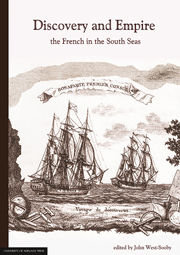Book contents
- Frontmatter
- Contents
- List of Figures
- List of Contributors
- Acknowledgements
- Introduction
- Note on the Second Frank Horner Lecture
- 1 The Globe Encompassed: France and Pacific Convergences in the Age of the Enlightenment
- 2 The Abbé Paulmier's Mémoires and Early French Voyages in Search of Terra Australis
- 3 The Acquisitive Eye? French Observations in the Pacific from Bougainville to Baudin
- 4 Discovering the Savage Senses: French and British Explorers' Encounters with Aboriginal People
- 5 A Case of Peripheral Vision: Early Spanish and French Perceptions of the British Colony at Port Jackson
- 6 New Creatures Made Known: Some Animal Histories of the Baudin Expedition
- 7 “Primitive race”, “pure race”, “brown race”, “every race”: Louis Freycinet's Understanding of Human Difference in Oceania
- 8 Imperial Eyes on the Pacific Prize: French Visions of a Perfect Penal Colony in the South Seas
7 - “Primitive race”, “pure race”, “brown race”, “every race”: Louis Freycinet's Understanding of Human Difference in Oceania
Published online by Cambridge University Press: 05 April 2014
- Frontmatter
- Contents
- List of Figures
- List of Contributors
- Acknowledgements
- Introduction
- Note on the Second Frank Horner Lecture
- 1 The Globe Encompassed: France and Pacific Convergences in the Age of the Enlightenment
- 2 The Abbé Paulmier's Mémoires and Early French Voyages in Search of Terra Australis
- 3 The Acquisitive Eye? French Observations in the Pacific from Bougainville to Baudin
- 4 Discovering the Savage Senses: French and British Explorers' Encounters with Aboriginal People
- 5 A Case of Peripheral Vision: Early Spanish and French Perceptions of the British Colony at Port Jackson
- 6 New Creatures Made Known: Some Animal Histories of the Baudin Expedition
- 7 “Primitive race”, “pure race”, “brown race”, “every race”: Louis Freycinet's Understanding of Human Difference in Oceania
- 8 Imperial Eyes on the Pacific Prize: French Visions of a Perfect Penal Colony in the South Seas
Summary
On 23 April 1821, François Arago reported to the Royal Academy of the Sciences on the results of Louis Freycinet's world voyage. His report, composed in collaboration with fellow savants Alexander von Humboldt and Georges Cuvier, among others, paid particular attention to the material that Freycinet had gathered in Oceania “on the races of men that live there, their state of civilisation, the development of diverse branches of agriculture and commerce, finally, on the causes that arrest or advance the progress of their society”. He explained that, in order to facilitate this research, Freycinet had “provided those men who would share his work with a series of questions that addressed in a methodical manner the physical, moral and political characteristics of man”. Arago commended the “advantages of this classification”, which had provided him and his scientific colleagues with extensive information on the Marianna Islands in particular: “we cannot give enough praise for this tableau”, he declared to the Academy.
It would appear, then, that Freycinet had provided the savants in Paris with a vast amount of empirical data deemed valuable to their research on the natural history of man. Given the purposeful and systematic approach he had taken to gathering this information, Freycinet might also have had something to say regarding that main anthropological question of the day: the cause and meaning of human difference.
- Type
- Chapter
- Information
- Discovery and EmpireThe French in the South Seas, pp. 215 - 244Publisher: The University of Adelaide PressPrint publication year: 2013

